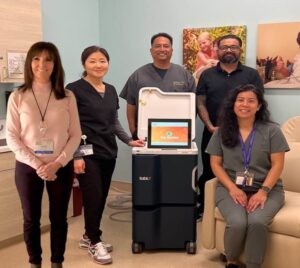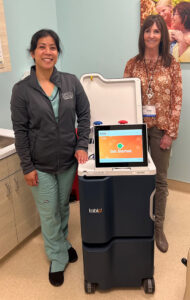Satellite Healthcare’s Graham Abra, MD: Enabling a Home Hemodialysis Mindset Shift

Summary
For Dr. Abra and his team at Satellite Healthcare, the Tablo Hemodialysis System is providing a real-time example of the ripple effect on the healthcare ecosystem when a technology puts the patient experience first.
Graham Abra, MD, is a Clinical Assistant Professor of Nephrology at Stanford University, and also Chief Medical Officer, Home Therapies, at Satellite Healthcare/WellBound, a leading national not-for-profit kidney care company, in the San Francisco Bay Area. With deep clinical expertise in the management of chronic kidney disease (CKD), he oversees the strategic direction of Satellite’s national home programs, where he has a leading role in helping more CKD patients live their best lives on home dialysis. He says that the 2019 Advancing American Kidney Health Initiative set the stage for today’s rapid growth and innovation in patient-centered dialysis care, that is being enabled by the real-world clinical benefits of advances such as the Tablo® Hemodialysis System.
“There’s a real focus now on home therapies, because of both the clinical benefits that they bring to patients, along with flexibility, empowerment and lifestyle advantages,” he says. “This accelerated once the pandemic hit, when one of the first recommendations was to stay home, with dialysis patients being particularly vulnerable. Tablo, as a patient-focused innovation, came along at the perfect time to offer important solutions to long-known clinical problems for home hemo, and to help us get more patients home.”
Mindset-Shifting Real-World Data
Dr. Abra served as a site investigator for the 2019 Tablo investigational device exemption (IDE) trial, and has been directly overseeing the implementation of Tablo throughout the Satellite Healthcare system. He is pleased to be observing a positive trend in benefits and patient outcomes of the first-of-its-kind technology playing out in real-world practice.
“Through the IDE trial, we got direct hands-on experience with Tablo and collected data showing that it was simple to use, and intuitive for patients, in particular those who had been using another home hemodialysis device,” he says. “We saw that because of the simplicity, the time needed to get a patient safe and competent with going home with their care partner might be shorter than what we had experienced previously, that might further translate into less patient burnout and attrition over time. Retention issues have been a huge barrier to home dialysis growth in the past.”
Dr. Abra says it has been game-changing to see these clinical benefits play out with his patients, once Tablo was FDA-cleared for patient use at home in 2020. Satellite Healthcare has been implementing the Tablo system across its network, as part of a 2021 multi-year joint effort with Outset Medical to drive home hemodialysis adoption within Satellite’s nationwide network of more than 80 dialysis centers.
He says that the decrease in training time with Tablo has been beneficial for both providers and patients. “Our Tablo implementation continues to expand to more and more clinics, and it has been exciting to see in real-world use that length of training time really come down, compared to what we see with other technology. That is really important with the current nursing shortage, where it is hard to find home hemodialysis nurses. If you can, with technology, expand the ability for nurses to care for others if they’re not locked up one-to-one for very long periods of time training a patient to be safe at home, that is meaningful.”

Dr. Abra also describes “a palpable sense of excitement” among physicians at Satellite clinics who are seeing positive clinical outcomes with patients on Tablo at home. “These physician champions are saying that home hemodialysis is something that they really can do more of, because now they’ve got something simple and different that opens up more possibilities.”
Dr. Abra also says they are seeing lower real-world Tablo home dialysis patient attrition rates, with findings published in a Satellite Healthcare study that was released at ASN Kidney Week 2022. “Seeing these real-world results is very important for the safety of patients, and for excellent patient care,” he says. “Providers need to see robust information that helps them feel confident when using something new and different. As physicians, as nephrologists, as healthcare professionals, we think about the risks and benefits of anything that we bring to patients, and understanding that deeply is how we improve care.”
“I think the simplicity of Tablo opens up transformational new care possibilities in a number of ways,” he continues. “One is just a mindset shift that it can bring about in nurses and doctors who treat patients. Once they see clinical data, and have seen and touched the device, they understand it. Suddenly it opens up a whole new conversation with their patients, about how and where dialysis can be delivered.”
Patient-First Ecosystem
Tablo is proving a real-time example of the ripple effect on the healthcare ecosystem when a technology puts the patient experience first, says Dr. Abra.
“Satellite and Outset, as organizations that are patient-oriented, start with the patient first and then also look at those who surround them: their care partners and family, and the people who take care of that whole system such as nurses, dieticians, social workers, technicians and physicians,” he explains. “When you design a product that works well for the patient first, and then take into account the whole surrounding ecosystem, that’s when you have something that can be really transformational. We have epidemic rates of burnout among healthcare professionals, and providing them with solutions that make their work more joyful and efficient, where they can feel proud and satisfied in the care that they’re delivering, those things are really important for us at Satellite,” he continues.
“Outset has done a really nice job putting forward a device that’s designed to be very simple, very usable, to not intimidate, to be something that integrates into the patient’s home as opposed to invades it,” says Dr. Abra. “I think it’s key to start with the patient, and truly understand what their challenges are, especially those who crash into dialysis with no education about their condition. Then, take care of the nephrologists and nurses who are training and supporting the patient. It is helping us push the conversation forward around how can we think about CKD differently, such that these types of patient-first care models can be sustainable.”
Dr. Abra’s perspective is echoed by Satellite Healthcare’s nursing staff, who say that Tablo gives them the personal satisfaction of helping their patients thrive at home.
Home Nurse Leaders See Impact on Patients and Retention
Sheri Kujundzich, RN, BSN, CNN, Satellite Healthcare’s Director of Home Operations for Southern and Lower Central California, has worked in ESRD patient care and dialysis for 43 years. She provides a multi-faceted perspective of home dialysis from the operations, nursing support and patient outcomes side.
“Home dialysis is where my heart is and where I truly feel that we can make a difference for our patients in how they manage their disease process, be successful and feel good while on dialysis,” she says. “Since Tablo has come along, it truly has lessened our home patients’ burden of therapy. It has cut our patient training time in half. It’s not a big learning curve for our nurses either. Everything about Tablo has definitely been a plus.”

“Satellite is very focused on quality outcomes and high care standards, and Tablo home dialysis fits in well with this model,” she continues. “The technology and the safety built in makes us feel comfortable as providers for our patients dialyzing at home.”
“It’s rewarding to get to see a difference in patients’ quality of life compared to in-center,” adds Eileen Aguilar RN, BSN, CNN, Center Home Therapies Manager in Orange County, CA. She says she has seen a “day and night” difference in how well patients do after switching to Tablo from another modality or from in-center dialysis. “Being in control of their dialysis can really help patients feel better and have a better quality of life,” she says.
Kujundzich, paralleling Dr. Abra’s comments, says that Tablo has helped solve one of their biggest challenges: patient retention at home. “Anytime we can have a therapy like Tablo that helps us retain those patients, elevates Satellite’s home penetration rate and maintain our excellent quality outcomes, that’s a huge benefit.”
Kujundzich also sees Tablo filling an urgent need for innovation, as their patients have been requesting the latest and greatest equipment. “Patients are ready for it. Tablo is taking us where we need to go in terms of enabling more patients to succeed long-term on their treatment at home. It always excites me when I see home patients who are enjoying their life around dialysis instead of making dialysis their life.”
About Satellite Healthcare
Satellite Healthcare, Inc. is a leading, national not-for-profit kidney care company dedicated to making life better for patients with kidney disease since 1974. Satellite Healthcare and its entities provide in-center and home dialysis services, innovative research and clinical trials, chronic kidney disease management, end-stage kidney disease management, physician practice management, dialysis dedicated clinical lab services, and medical nutritional therapy. Our focus is to improve the quality and access of home dialysis care, reduce costs and implement integrated value-based care models. We operate in five states and have relationships with some of the most prestigious nephrologists and institutions in the country.

